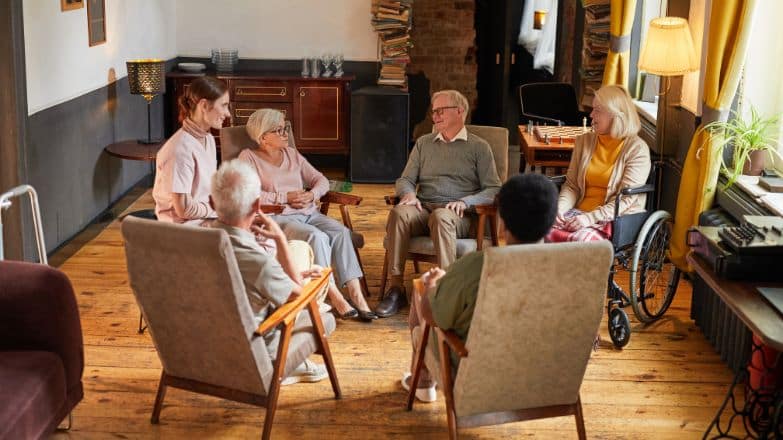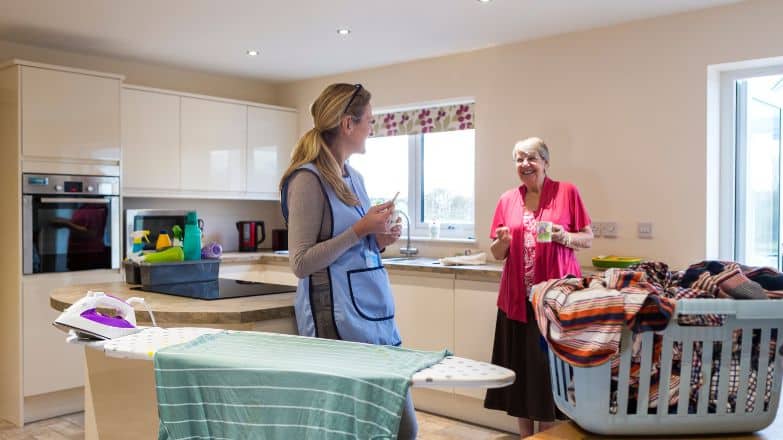The importance of care for seniors at home is becoming a major concern. According to an annual survey by AARP, three out of four Americans aged over 50 want to stay in their home. Some of those older may have wished their homes or communities were closer and able to remain independent while others do it for personal reasons. Sometimes it can be financially necessary to aging instead of moving into an assisted living unit. However, aging has disadvantages in its place.
How To Take Care of Elderly Parents at Home
Adults looking for care for their ailing parents at home are given options. Often primary care providers feel it can be accomplished by planning or medical guidelines. The best method of caring for a senior at home can involve the following methods.
Family caregivers play a vital role in ensuring the well-being and comfort of their elderly parents at home. With the support of in-home care services and professional caregivers, this responsibility becomes more manageable.
Firstly, family caregivers should establish open lines of communication with their loved ones to better understand their needs and preferences. Regular check-ins and active listening can foster trust and enable an effective care plan to be developed.
In collaboration with professional in-home caregivers, you can ensure that daily activities such as bathing, dressing, medication management, and meal preparation are carried out efficiently while maintaining a sense of independence for their aging parents. These skilled aides not only offer physical assistance but also provide emotional support by engaging in meaningful conversations or accompanying seniors during recreational activities tailored to their interests.
Additionally, as part of the caregiving team, family members must monitor any changes in health conditions diligently; they should be proactive in coordinating medical appointments or arranging transportation when necessary.
Through regular collaboration with healthcare professionals and utilizing technology-driven solutions that enhance safety within the home environment, family caregivers can create a secure space where elderly individuals feel cherished and cared for while enjoying comfortable living arrangements within familiar surroundings at all stages of life.
Develop your skills and knowledge in support work for older people. Community Care Toolkit provides an online learning experience that helps you develop your skills and learn new ones.
What is aging in place?
Aging means staying at home until older, rather than moving out of retirement homes or nursing homes. Aging is a good option for seniors with limited daily tasks – with a close family member or friend close to the home or who have a reliable caregiver.
Through exploring the services available enable seniors, you can determine how to preserve your independence and enjoy your golden eons in your life. Generally speaking, most people will require some kind of support after age 66, but this can become difficult to accept when considering at home care for elderly.
Aging in place vs. other types of senior housing
If you want companionship in the home and you feel isolated, you may consider establishing an independent living or retirement community as an option. It's a more comfortable place for aging adults and although the resident lives independently most community facilities offer facilities and service.
As its name implies, independence in life means more ease and less loss of self-confidence. However, if you or the spouse needs medical attention, you may be able to consider the same assisted living community and care system.
For additional info, please contact Senior Housing Options. World's largest medical clinic. All in-store.

Assisted living facility versus At Home Care services
When considering options for long-term care, individuals and their families often find themselves pondering the merits of assisted living facilities versus in-home care.
Assisted living facilities offer a comprehensive range of amenities designed to provide a supportive environment for aging adults. Residents benefit from professional assistance with daily activities, such as bathing and dressing, ensuring their safety and comfort at all times.
Moreover, at an assisted living facility, where they offer social opportunities through organized events and communal spaces, fostering companionship and combating feelings of isolation that can arise as one ages.
On the other hand, in-home care allows individuals to remain in the familiar surroundings of their own homes while receiving necessary assistance tailored to meet their specific needs. Skilled caregivers visit regularly to provide personal attention, administer medications if needed, and help with household tasks like meal preparation or light housekeeping.
This option ensures continuous personalized care while granting seniors increased autonomy within a space laden with cherished memories.
Ultimately, whether opting for assisted living facilities or in-home care depends on individual circumstances such as health requirements and personal preferences – both approaches aim to optimize the quality of life during later stages by delivering compassionate support essential to maintain independence.
Types of Home Care
There is a range of types of assistance and responsibilities of providers within a homecare service. How much health care you need varies from your ability to work and your budget. Home care is one of three most widely used kinds of home care, including companion services. Depending on client needs and preferences, they may transition from home care to different types.
In-home care encompasses a wide array of services provided to individuals who require assistance and support while living in the comfort of their own home. It is a comprehensive term that includes various forms of caregiving, ranging from minimal help with daily tasks to specialized medical care.
Professional caregivers play a vital role in delivering personalized attention tailored to the unique needs of each individual. These skilled professionals, also known as home health aides, are trained extensively to offer compassionate and reliable support across diverse aspects such as personal hygiene, meal preparation, medication administration, mobility assistance, and companionship.
Their expertise extends beyond meeting physical needs; they prioritize emotional well-being by offering genuine companionship and establishing trust-based relationships with those they serve. With their unwavering dedication and proficiency in providing professional in-home care, these caregivers empower individuals to maintain independence while ensuring their holistic welfare is prioritized.
Home Health Aides
Known as “extended care.” These programs offer non-medical assistance to help certain veterans maintain their independence. Extended care is available to a veteran with a service-connected disability or to any veteran who has very low income and needs long-term care.
Extended care can include In-home aides and homemaker services like adult daycare, which provides health maintenance and rehabilitative services to veterans in a group setting during daytime hours, either at a VA or community care facility. Community senior living centers, offer care for veterans with chronic stable conditions (including dementia).
Aging Services Division dedicated to providing frail seniors with home and community-based services, so that they can continue living in their own homes, instead of having to enter a nursing home. A wide range of state assistance programs are generally available to eligible seniors, including in home care services and skilled nursing care, home-delivered meals, help with household chores, transportation to shopping and medical appointments, as well human services such as counseling, advocacy and legal aid. In addition to these programs that help senior citizens directly, many states also offer caregiver assistance.
can include things such as grab bars in the shower, ramps to avoid or minimize the use of stairs, or even installing a new bathroom on the ground floor. Personal care. Help with the activities of daily living, such as dressing, bathing, or meal preparation, is called personal or custodial care. In home care services can provide personal care services that range from a few hours a day to around-the-clock live-in care.
They may also provide limited assistance with things such as medical supplies such as taking blood pressure or offering medication reminders. Health care. Some healthcare services can be provided at home by trained.
The range of services that one can receive from a home health aide is similar to what one would receive in a nursing home. Wound care, IV insertion, and occupational and physical therapy are all available with a home health care aide.
Unlike companion care aides and personal care assistance, home health aides must have specialized training and certification, such as a nursing certificate, in order to perform these services. Those who have the proper certifications can even administer skilled nursing care in clients' homes. Helpful Resources Get Help Qualifying for Medicaid Alternatives to Nursing Homes
Companion Care Services
These companion services offer the best care for a person who lives independently and does not need much help in everyday life. Those who require support often feel isolated at home. The assistant provides much-needed assistance for at home care for elderly loved one's safety.
A home care professional providing companionship care may spend merely time with a client and engage in their lives reading to him, participating in a client's hobbies like playing games or walking, or giving advice. An elder care companion can help with transportation or assist with medical care.
Senior Companion and Friendly Visitor Programs
These programs give older adults the chance to interact socially with volunteers usually other senior citizens who come to visit a senior to discuss or read to a visually impaired adult. The volunteer could even take senior citizens out of school to have fun and do small housekeeping tasks for themselves. It can help prevent social isolation by identifying signs of the older person developing an additional or severe health condition which may require urgent attention.
Talking to a loved one about home care services
Sometimes the pain can be overwhelming to see older adults who has no control over their care. Maybe you noticed that your family member's house is dirtier today than it was before. Maybe the fact is they've not taken long baths, or the refrigerator doesn't contain much food.
Maybe someone you know fell or saw a pan burning in the oven unattended. Often, the decline is gradual and sudden changes or traumatic losses cause problems. These indicate it may be time to discuss at home care or nursing home care.

Options For Care Outside of the Home
In certain instances, bringing your own family members into the house isn't possible. The assisted living system provides several different types of social services and assistance to older children. The programs also offer assistance with the rehabilitation of older seniors. Various services available at home include:
Caregiver Assistance Services
The majority of nursing home and respite services used for seniors are offered by a nonpaid family caregiver who freely shares their own time and helps to ensure their elderly relatives stay at home in the family for as long as possible. Family caregivers of elderly people are able to access support and assistance via various programmes geared specifically toward their needs.
Personal Care Assistance
Personal care services can help senior citizens maintain normal daily activities. A personal assistant may offer a wide variety of services such as assistance with bathing and toileting, grocery shopping or mobility assistance to prevent falling. This aide cannot provide any medical services beyond prescription medications.
It is comparable to the services offered at assisted living facilities. Personal Care Assistants can certainly make your life simpler. But it doesn't work in the absence of people that need specialized medical care.
Use adult day care
In-home care may be enhanced by supplemental adult daycare. Your loved one can spend several weeks in adult daycare centers. This allows for primary caregivers to focus on other things or get away. It's not just a caregiver benefit that adults have.
Adult Daycare Centers generally offer lunch, activities, fitness and transportation. This program allows the patient in the same senior care center to move away from isolation from the family life, socialize with other people and participate in activities that might not exist. Many daycares accept children with moderate Alzheimer's disease.
Home Care and Home Health Care Services
Home care encompasses a vast variety of services that are further extended through home healthcare. Here is a list of possible homecare services. Service offered by a caregiver depends largely on their need and preference and occasionally on the capacity of the individual. It is important for caregivers to have the capability to provide all necessary care prior to signing any contracts.

Paying for Home Care Services
Even though some home care services are more expensive, home care is often more expensive. In a short article below, we examine the costs associated with in-home care and financial aid to assist elderly people to cover costs related to care.
Senior Housing Assistance
The government's Housing Assistance Program supports seniors in their accommodation needs. These programs are largely funded through the federal government but are governed through the state and regional agencies on aging.
How Can I Pay for Home Care?
Many older adults and their families have problems paying for their care either from home or in the community. It's fortunately possible to receive funding through the use of home care programs and other financial support services. Let's find out how these different solutions can reduce your burden.
Private insurance and some insurance policies will reimburse the costs associated with in-home care. It typically applies for people who have long-term care or other health insurance, because many of the long-term care providers do not carry the coverage. Life insurance aims to provide senior services and includes nursing homes.
How Much Does Home Care Cost?
Across the nation, the cost of home care for older adults is estimated at $499 per month. Home medical treatment costs are more expensive and average $5148 a month. However, home health care may include nursing services and is a cheaper alternative.
This number is the national average. Depending upon where you are, home care is considerably less expensive and often even higher.
Hire free or low-cost companion care
Homecare is available anywhere around $20-$30 an hour or a lot higher. When time is tight and care needs increase, think about what type / help will be required. For those who need assisted living in some way, companion care may be the ideal alternative.
Providing companionship is a part time occupation and can help maintain regular routines. Care can provide companionship and help with the household tasks. How do we offer low-cost companionship for our family members?
Do Medicare and Medicaid Cover Home Care?
Medicare is a popular federally funded health care program administered as part of Medicaid. Unless your spouse and child qualify as a Medicaid beneficiary, you may wonder what services will cover them in a healthcare setting? What should be known about homecare coverage for each program?
Medicaid and Home Care
Medicaid pays for nursing homes. Each state operates its Medicaid program, so eligibility criteria and services covered may differ between states.
Can Medicaid be helpful when paying for home healthcare? Home care services can be accessed through a state Medicaid program but can also be accessed by Medicaid waivers from Home and Community Services (HCBS).
Is insurance provider of Medicare Home Care able to provide quality of life for the elderly? The applicant must meet a particular requirement in order for Medicaid eligibility to apply, and therefore home care is needed. State residents must also meet two basic requirements for admission.

Tips for hiring home care providers
How you choose to hire the help you need is partly dependent upon what type of help you need. Hiring a shop assistant can be different from hiring someone for personal care. It is important to remember a few important things. The longer and harder a hiring procedure will take, the more success you can get.
Supplemental Nutrition Assistance Program (SNAP)
The Supplemental Nutrition Assistance Program (SNAP), also referred to as Food Stamps, is a federal program that provides monthly financial aid to eligible citizens. Although it's a federal program it is administered at a national level, so please consult your local Agency on Aging for assistance using these programs. Read the full list of SNAP programs in the U.S. and its benefits in the article SNAP for seniors.
Caregiver Counseling
Services for aging provides caregiver information about obtaining benefits from government and other government programs for the elderly. Caregiver counseling encompasses a crucial aspect of supporting individuals who provide care for their loved ones within the comfort and familiarity of their own home.
This specialized form of therapy, conducted by trained healthcare professionals, aims to address the unique challenges faced by caregivers and assist them in navigating the demanding responsibilities associated with caregiving services. Through a compassionate and empathetic approach, these professionals create a safe space for open dialogue, where caregivers can freely express their emotions, concerns, and frustrations surrounding their role.
By delving into various aspects such as stress management techniques, coping strategies, effective communication skills, and self-care practices tailored specifically to each caregiver's situation; this counseling process equips them with invaluable tools to enhance both their physical and mental well-being. Moreover, it encourages them to reflect on personal boundaries while fostering resilience amidst the inevitable complexities that accompany providing care in one's own home setting.
Long Term Care Ombudsman
The Long-term Care Ombudsman is a local office of a state agency established under Older American laws. The office is able to investigate and resolve complaints from seniors and their parents about care in a variety of long-term care settings. Ombudsman Representatives work in the capacity of advocates for older persons responding to individual complaints to ensure residents are treated with dignity and respect in their daily lives.
Program of All Inclusive Care for the Elderly (PACE)
PACE offers a specific service to the elderly that offers integrated Medicare and Medicaid services to the frail and improve their quality of life.
Chore and Homemaker Assistance
Senior citizens may apply for support in household tasks such as preparing meals or washing grass, removing leaves, weeds and clearing the snow.
Section 8 Housing
Section 8 Housing is a state-sponsored federal program that allows seniors to purchase rented homes or apartments by an owner. Read about our article on government senior programs.
Develop your skills and knowledge in support work for older people. Community Care Toolkit provides an online learning experience that helps you develop your skills and learn new ones.
Frequently Asked Questions
Can I get paid to watch my elderly parents?
Depending on what you are paying for, Medicaid can help pay for care for a person who is aging at home.
What is it called when you help the elderly at home?
Help with daily tasks such as dressing and bathing is called personal and custodial care. Home Health Assistant provides care 1-3 hours daily to 24-hour living care.
What is a senior aid helper?
It also helps with home renovations, daily activities, and housekeeping. Senior helper services are also available for those elderly who may be lonely. But remember, seniors aren't nurses. The elderly support workers do not provide health care.
